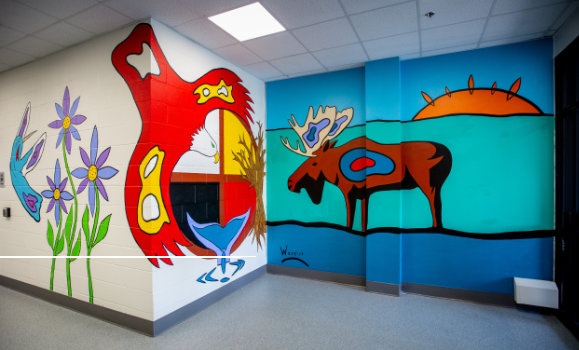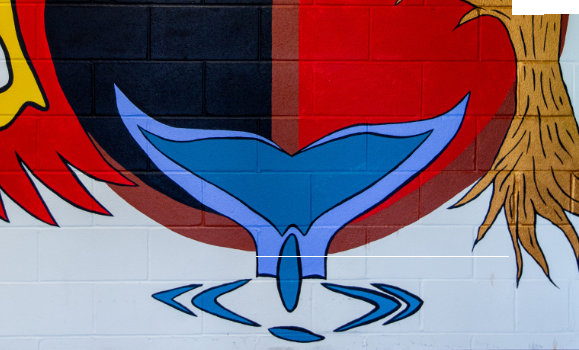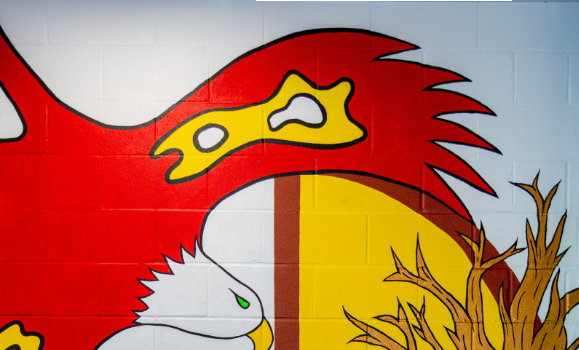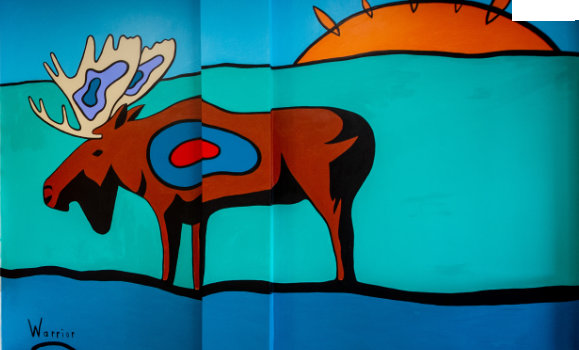News
» Go to news mainWarrior on the Hill

Lorne Alexander Julien is a proud Mi‚Äôkmaw artist and member of Millbrook First Nation, Nova Scotia. He recently completed two murals on the Agricultural Campus in Cox Institute ‚Äď one in the new Indigenous Student Space in East Cox and most recently one in the entrance of West Cox.
Julien is a self-taught artist specializing in rich vibrant colours. He creates murals in schools, institutions, and public spaces to Indigenize and create safe spaces that are inclusive, respectful and honour Canada’s Indigenous People. He believes incorporating Indigenous art in public spaces is a simple act of reconciliation and moving forward in a spirit of mutual respect and understanding.
‚ÄúThe painting reminds us to honour the cycles and respect all the elements when we work with the land,‚ÄĚ explained Julien.
‚ÄúThe centre of the mural shows the medicine wheel, representing the four colours, the four seasons, the four directions. There are many teachings in the medicine wheel,‚ÄĚ said Julien.¬† ‚ÄúIt can also represent the circle of life.‚ÄĚ
 ‚ÄúThe whale (putup) represents water and all the water cycles and the life that depends on the water. The tree is connected to the earth and the air.¬† We breath in what the trees breathe out and vice versa, that is how we survive,‚ÄĚ he added.
‚ÄúThe whale (putup) represents water and all the water cycles and the life that depends on the water. The tree is connected to the earth and the air.¬† We breath in what the trees breathe out and vice versa, that is how we survive,‚ÄĚ he added.
 ‚ÄúThe eagle (kitpu) is an important element in my paintings, they are protectors and represent love. The hummingbird (militaw) symbolizes beauty, joy, and playfulness.¬† The moose spirit (tiam) coming into the mural from the side is a woodland creature, tiam stands for protecting habitats and the need to share the earth in a good and respectful way.‚ÄĚ
‚ÄúThe eagle (kitpu) is an important element in my paintings, they are protectors and represent love. The hummingbird (militaw) symbolizes beauty, joy, and playfulness.¬† The moose spirit (tiam) coming into the mural from the side is a woodland creature, tiam stands for protecting habitats and the need to share the earth in a good and respectful way.‚ÄĚ
 Lorne‚Äôs Mi‚Äôkmaw name is ‚ÄėWarrior on the Hill‚Äô (Sma'knis) which was given to him in his youth when he learned about the spiritual way of his people. His artwork is a form of prayer, providing healing for himself and to the world. His intention is to inspire hope and balance within the universe.¬†
Lorne‚Äôs Mi‚Äôkmaw name is ‚ÄėWarrior on the Hill‚Äô (Sma'knis) which was given to him in his youth when he learned about the spiritual way of his people. His artwork is a form of prayer, providing healing for himself and to the world. His intention is to inspire hope and balance within the universe.¬†
These two murals are a small step in a much bigger plan to help Indigenize the Agricultural Campus to be a welcoming and inclusive space for all learners and one in which indigenous students can see their community honoured and reflected.
‚ÄúThe Indigenous Student Space in East Cox is always being used by students and their allies, often for the meeting of the Indigenous Student Collective and a place to host Indigenous events‚ÄĚ explained Keah Gloade, manager of Indigenous students.
One of the features students take great pride in, is the mural in this space.
‚ÄúIt has important meaning with colours reflecting residential schools, animal symbolism for the concept of love and family as well as representing the four pillars of the medicine wheel,‚ÄĚ she added.¬† ‚ÄúI‚Äôm so proud to have such a meaningful space on campus feel complete with the addition of the mural for our Indigenous students. I‚Äôm excited for the students to return in September and see the addition of our newest mural in West Cox, they will feel valued and appreciated in their Indigeneity on campus- which is reconciliation in action.‚ÄĚ
Keah works to help foster Aboriginal student success by providing specialized advising and support. Additionally, she serves to assist faculty and staff to create a welcoming and inclusive campus environment.
This includes working to Indigenize the curriculum of several first-year courses as well as select second year courses.  The Faculty of Agriculture is also developing a series of co-curricular activities on campus with an aim of increasing Indigenous cultural awareness and inclusivity.  
The incorporation of Indigenous perspectives and ways of knowing in curriculum, policy and on campus landscapes will ensure administrators, faculty and staff have a broader understanding of Aboriginal culture, values, traditions, and customs.
The Indigenous Student space also provides a second space for smudging.
‚ÄúIt makes our room so inviting, its nice to have visual representation of our values,‚ÄĚ said Kylie Harquail Simonson, President of the Indigenous Student Collective. ‚ÄúNo matter where we are, we are connected.‚ÄĚ
The Indigenous Student Access Pathway (ISAP) has also been designed and delivered as a one-year program exclusively for First Nations, Metis and Inuit students who would not otherwise be eligible for admissions and who would benefit from dedicated supports while transitioning to a university environment.
Throughout the student experience there will be opportunities for community involvement, access to Dalhousie’s Elders in Residence program and more.  By immersing students in a strong and supportive network of faculty, staff, and peers the ISAP aims to provide both the tools for navigating post-secondary and a culturally supportive environment needed to succeed.
The Agricultural Campus is also uniquely situation among 13 First Nations communities and in 2016 permanently installed the Mi’kmaq Grand Council Flag- a first for a Nova Scotia university - acknowledging the campus sits on Traditional Territory of the indigenous Mi’kmaq people
‚ÄúOur campus is a place of learning for everyone, no matter their background, culture, gender or sexual orientation,‚ÄĚ said Dean David Gray.¬† ‚ÄúIt is crucially important that members of our indigenous communities see themselves here as part of our community and feel welcomed. It is also important, as a place of learning, that we embrace the knowledge of our indigenous elders and share with all.‚ÄĚ
For those who have a vested interest in a university experience and in particular a science experience, are also offered an opportunity to spend a weekend on the Agricultural Campus.
Awtiket Summer Camps, meaning ‚Äėclearing a path‚Äô are offered to Indigenous students aged 12 ‚Äď 16 years of age over a weekend to immerse them in university life.¬† Students attend classes, stay in residence and experience extra-curricular activities.
Recent News
- MacRae Library Summer Hours
- Faculty of Agriculture students win the top awards at the Science Atlantic conference
- Annual Sustainability and Transportation Survey
- Engineering banquet brings students, faculty together in celebration of community
- Engineering Excellence: Students triumph at Atlantic competition, earn National silver
- Engaging with the African Nova Scotian Community
- The Dal AC International Guest House is Now Open!
- Dal AC International expands global learning with GSO funding
